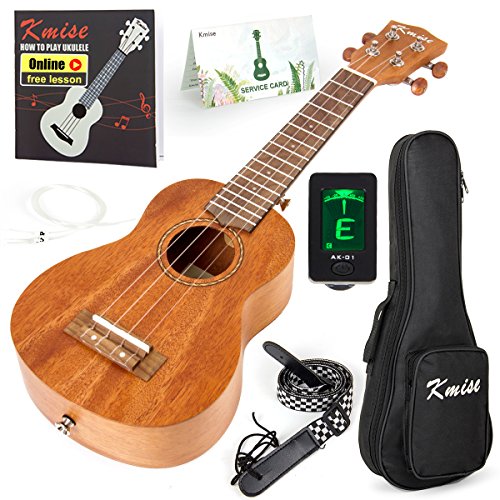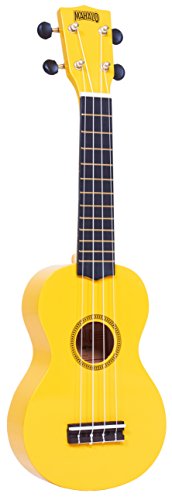How to Choose the Ukuleles
Goodmorning my friends, I’m Jane Smith, editor at best2buy.reviews. Today, I will share you some tips for choosing Ukuleles. Let’s explore!
- 1. What are Ukuleles?
- 1.1. Types of Ukuleles
- 1.2. Soprano Ukulele:
- 1.3. Concert Ukulele:
- 1.4. Tenor Ukulele:
- 1.5. Baritone Ukulele:
- 1.6. Other Variations:
- 2. Size of Ukuleles
- 2.1. Soprano Ukulele:
- 2.2. Concert Ukulele:
- 2.3. Tenor Ukulele:
- 2.4. Baritone Ukulele:
- 3. Benefits of Ukuleles
- 3.1. Ease of Learning
- 3.2. Affordability
- 3.3. Portability
- 3.4. Quick Progress
- 3.5. Versatility
- 3.6. Social and Group Activities
- 3.7. Stress Relief
- 3.8. Creativity and Expression
- 3.9. Improved Coordination
- 3.10. Musical Foundation
- 3.11. Enjoyment and Fun
- 4. How to choose Ukuleles?
- 4.1. Determine Your Budget:
- 4.2. Select the Size:
- 4.3. Consider the Wood and Build:
- 4.4. Decide on Acoustic or Electric:
- 4.5. Check Playability:
- 4.6. Try Before You Buy:
- 4.7. Listen to the Sound:
- 4.8. Check for Quality and Craftsmanship:
- 4.9. Consider Brand Reputation:
- 4.10. Accessories and Extras:
- 4.11. Personal Preference:
- 4.12. Maintenance and Care:
- 5. In conclusion
What are Ukuleles?
Ukuleles are musical instruments that belong to the guitar family. They are typically smaller in size and have four strings, although there are variations with more strings. Ukuleles are known for their bright and cheerful sound and are often associated with Hawaiian music, though they have become popular in various music genres worldwide.

Types of Ukuleles
The most common types of ukuleles include:
Soprano Ukulele:
- Size: The soprano ukulele is the smallest and most traditional size.
- Tuning: Standard tuning is G-C-E-A.
- Scale Length: Typically has a scale length of around 13 inches.
- Sound: Known for its bright, cheerful, and classic ukulele sound.
- Playability: Great for beginners due to its small size and ease of play.
Concert Ukulele:
- Size: Slightly larger than the soprano, making it easier to handle.
- Tuning: Also uses standard G-C-E-A tuning.
- Scale Length: Typically has a scale length of around 15 inches.
- Sound: Offers a fuller and warmer tone compared to the soprano.
- Playability: Provides a bit more room for finger placement, making it comfortable for many players.
Tenor Ukulele:
- Size: Larger than the concert ukulele.
- Tuning: Often tuned to G-C-E-A, but it can also be tuned differently for various styles.
- Scale Length: Typically has a scale length of around 17 inches.
- Sound: Has a richer and deeper tone compared to smaller ukuleles, making it versatile for different music genres.
- Playability: Offers more frets and space for complex chord shapes and fingerpicking.
Baritone Ukulele:
- Size: The largest of the common ukulele sizes.
- Tuning: Typically tuned to D-G-B-E, which is similar to the top four strings of a guitar.
- Scale Length: Typically has a scale length of around 19 inches.
- Sound: Produces a deeper and more guitar-like tone compared to other ukuleles.
- Playability: Offers a wider fretboard, making it easier for guitar players to transition to the ukulele.
Other Variations:
Besides the common types mentioned above, there are specialty ukuleles, such as the sopranino (even smaller than the soprano), super-concert (slightly larger than the concert), and bass ukuleles (tuned like a bass guitar).
Size of Ukuleles
Sizes of ukuleles soprano, concert, tenor, and baritone.:
Soprano Ukulele:
- Overall Length: Approximately 21 inches (53 cm)
- Scale Length (length of the vibrating strings): About 13 inches (33 cm)
- Fret Count: Typically has 12 to 15 frets
Concert Ukulele:
- Overall Length: Approximately 23 inches (58 cm)
- Scale Length: About 15 inches (38 cm)
- Fret Count: Usually has 15 to 20 frets
Tenor Ukulele:
- Overall Length: Approximately 26 inches (66 cm)
- Scale Length: About 17 inches (43 cm)
- Fret Count: Typically has 15 to 20 frets
Baritone Ukulele:
- Overall Length: Approximately 30 inches (76 cm)
- Scale Length: About 19 inches (48 cm)
- Fret Count: Usually has 18 to 21 frets
Benefits of Ukuleles
Some of the key advantages of learning and playing the ukulele:
Ease of Learning
The ukulele is often considered one of the easiest instruments for beginners to pick up. Its small size and four nylon strings make it less physically demanding on the fingers compared to instruments like the guitar. This accessibility encourages people of all ages to start playing music.
Affordability
Ukuleles are relatively inexpensive compared to many other musical instruments, making them a budget-friendly option for those who want to explore music without a significant financial investment.
Portability
The ukulele's compact size and lightweight construction make it highly portable. You can easily take it with you to play music on the go, whether you're traveling, camping, or simply enjoying the outdoors.
Quick Progress
Due to its simplicity, beginners can make rapid progress on the ukulele. Learning basic chords and strumming patterns allows for the quick playing of songs, which can be a rewarding experience.
Versatility
While the ukulele is often associated with Hawaiian music, it can be used to play a wide range of musical genres, including pop, rock, folk, jazz, and more. Its versatility makes it suitable for different musical tastes and styles.
Social and Group Activities
Playing the ukulele can be a social and communal activity. Ukulele clubs and groups are common, and many people enjoy playing and singing together, fostering a sense of community and camaraderie.
Stress Relief
Like playing any musical instrument, playing the ukulele can be a therapeutic and stress-relieving activity. Music has been shown to have positive effects on mental well-being, and the act of playing and focusing on music can provide a sense of relaxation and fulfillment.
Creativity and Expression
The ukulele allows for creative expression through songwriting and improvisation. Musicians can compose their own music or put their unique spin on existing songs, fostering creativity and self-expression.
Improved Coordination
Playing the ukulele involves coordinating finger movements on the fretboard with strumming or picking patterns. This helps improve hand-eye coordination and fine motor skills.
Musical Foundation
Learning to play the ukulele can serve as a stepping stone to learning other musical instruments, particularly the guitar. The skills and musical knowledge gained from playing the ukulele can be transferable to other instruments.
Enjoyment and Fun
Perhaps the most significant benefit of playing the ukulele is the sheer joy and fun it brings. Music is a source of enjoyment and entertainment, and playing the ukulele can be a fulfilling hobby that brings happiness and a sense of accomplishment.
In summary, the ukulele is a versatile, accessible, and enjoyable instrument. Ukulele offers numerous benefits, from enhancing musical skills to providing personal satisfaction and relaxation
How to choose Ukuleles?
Kindly check the steps to help you choose the perfect ukulele:
Determine Your Budget:
Decide how much you're willing to spend on a ukulele. Ukuleles come in a wide price range, from very affordable to high-end models, so setting a budget helps narrow down your options.
Select the Size:
Determine which ukulele size best suits you. The most common sizes are soprano, concert, tenor, and baritone, each with its own sound and playability. Consider factors like your hand size, comfort, and the sound you desire.
Consider the Wood and Build:
Ukuleles are made from various woods, each imparting its own tonal qualities. Common woods include mahogany, koa, spruce, and cedar. The wood choice can affect the instrument's sound, so research and listen to different wood types to find the one you prefer.
Decide on Acoustic or Electric:
Decide whether you want an acoustic ukulele or an electric-acoustic (pickup-equipped) one. If you plan to perform live or record, an electric-acoustic ukulele is a good choice. Otherwise, a standard acoustic ukulele is sufficient.
Check Playability:
Playability is crucial. Test how comfortable the ukulele feels in your hands. Pay attention to factors like the neck width, string height (action), and fret spacing. An instrument that feels comfortable to play will encourage you to practice more.
Try Before You Buy:
Whenever possible, play the ukulele before purchasing it. Visit a music store and try different models to get a sense of their playability and sound. If you're a beginner and unsure how to play, ask a knowledgeable staff member to demonstrate the instrument for you.
Listen to the Sound:
Listen to the ukulele's sound. Strum the strings and listen to the tone. Pay attention to whether it has the bright, warm, or full sound you desire. The wood type, size, and construction play a significant role in the sound.
Check for Quality and Craftsmanship:
Examine the ukulele closely for build quality. Look for signs of good craftsmanship, such as smooth fret edges, even finish, and securely attached components. A well-made ukulele is more likely to stay in tune and last longer.
Consider Brand Reputation:
Research reputable ukulele brands and models. Established brands often have a history of producing quality instruments. Read reviews and seek recommendations from experienced ukulele players.
Accessories and Extras:
Consider what accessories come with the ukulele. Some packages include gig bags, tuners, straps, and spare strings, which can be valuable for beginners.
Personal Preference:
Ultimately, choose a ukulele that resonates with you both in terms of sound and aesthetics. Your personal connection to the instrument can motivate you to play and practice more.
Maintenance and Care:
Understand the maintenance requirements of the ukulele you choose. Proper care, such as keeping it in a humidified environment and regular string changes, can extend its lifespan.
Remember that choosing a ukulele is a personal decision, and what works for one person may not work for another. Take your time, do your research, and consider these factors to select a ukulele that suits your needs and brings you joy when playing.
In conclusion
Overall, ukuleles are beloved for their charming and distinct sound, making them a delightful addition to both casual and professional musicians' collections.
If you are finding where to buy ukuleles, you can go to Amazon. But in Amazon has many products, and you will meet a trouble to choose the best product. Don’t worry! We help you. We have top featured products which highly appriciate. That wonderfull suggession for you. Try and Buy it now!
I’m Jane Smith, editor at best2buy.reviews. If you have any questions, please feel free to let me know. I’m always availabe to respone any your questions.










